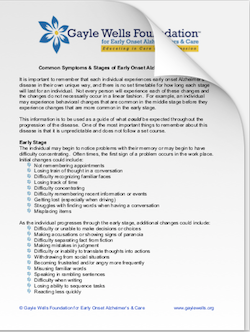Causes & Risk Factors
Causes & Risk Factors
The cause of early onset Alzheimer’s disease is not known. Through research, there are some risk factors that have been identified as possibly being associated with a diagnosis of early onset Alzheimer’s disease. Please note there can be additional causes and risk factors to the following:
- Scientists have identified several rare genes that directly cause “familial Alzheimer’s disease” People who inherit these rare genes tend to develop symptoms in their 30s, 40s and 50s.
- Head injuries
- High blood pressure
- Metabolic syndrome is a group of conditions that can include increased blood pressure, high blood sugar, excess body fat around the waist, and abnormal cholesterol or triglyceride levels.
- Smoking can raise the risk of developing Alzheimer’s disease by as much as 50%
- Type II Diabetes, which leads to high blood sugar, can cause vascular problems. It is thought that insulin resistance leads to inflammation that can damage the brain by disrupting the proper formation of neuron connections
- Individuals that are overweight or obese in midlife may be at a higher risk
- Down’s Syndrome
- Alcoholism
There are various medical conditions that can cause cognitive symptoms, but do not results in a diagnosis of early onset Alzheimer’s disease. This is one of the reasons it is so important to record all medical conditions, medications, and symptoms and schedule an appointment with your doctor.
Early Symptoms
- It is important to remember that people can experience different symptoms and progression of the disease; however, the following are some common symptoms of early-onset Alzheimer’s disease.
- Impaired communication
- Inability to follow directions
- Problems with language
- Impaired visuospatial skills (becoming lost or disoriented in familiar
environments) - Social withdrawal and less willingness to interact with others
- Loss of motivation or initiative
- Confusion
- Restlessness
- Misplacing things
- Trouble performing familiar tasks
- Changes in personality and behavior
- Poor or decreased judgment
- Memory loss
Possible Symptoms during Course of Early Onset Alzheimer’s
It is important to remember that each individual with early onset Alzheimer’s disease experiences the disease in their own unique way. We are often asked what “stage” of the disease a loved one might be encountering. There is not a definite answer for this, and typically, we don’t like to refer to people in stages, but it can be helpful in understanding the symptoms and progression of the disease.
It is important to realize not every person will experience all of these changes and the changes do not necessarily occur in a linear fashion. For example, an individual may experience behavioral changes that are common in the middle stage before they experience changes that are more common in the early stages. Generally, the stages of dementia are referred to as early, middle, and late stage and we will refer to these stages in our materials. Many medical professionals use a 7-stage framework and makes reference to “age-related” changes. Early-onset Alzheimer’s disease occurs outside of “age-related” changes; therefore we use the general stages of early, middle, and late. We have, however, noted the numbered stages in parenthesis so that you can use that as a guide as well.
Click here to access Common Symptoms & Stages of Early Onset Alzheimer’s Disease


